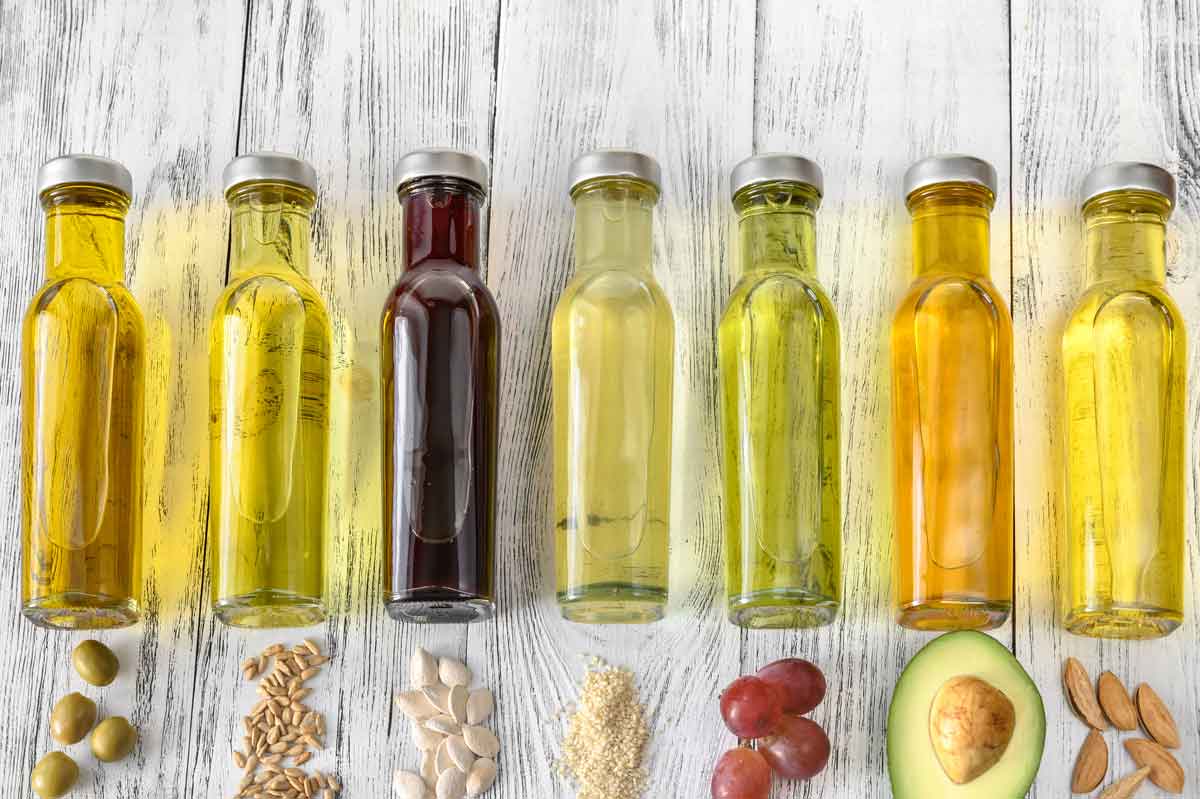
Cooking Oils 101
WRITTEN BY KRISTINA TELHAMI AND DR. SWATHI
When it comes to cooking oils, there is a lot of confusion about which oils to use and at what specific temperature to cook with them. Not all oils are created equal and using the right types of oils can have a huge impact on your health.
What oils should we avoid?
First and foremost, it is important to understand which oils to avoid and why. We want to avoid things like vegetable oils, cottonseed oil, corn oil, grapeseed oil, soybean oil, peanut oil, and sunflower oil due to the high omega-6 fatty acid content (1). Read on to learn more.
What’s the difference between omega-6 and omega-3?
Both omega-6 and omega-3 fatty acids are needed to come from the foods we eat, and are therefore also known as essential fatty acids. The ratio between these oils for consumption is optimal when at 1:1 (omega-6:omega-3). However, the Standard American Diet has an average ratio closer to 2:1. Studies have shown that a diet higher in omega-6 to omega-3 fatty acids can result in chronic inflammation leading to diseases such as diabetes, cancer, and heart disease (2). Another observational study showed that higher omega-6 fatty acid consumption is associated with an increase in these inflammatory diseases as well as obesity and inflammatory bowel disease (IBD) (1).
Why should we avoid vegetable oils?
Vegetable oils, which contain polyunsaturated fatty acids, are refined and chemically altered due to how they are extracted. They are also easily oxidized due to the double bonds in polyunsaturated fats. (3). When you consume polyunsaturated fatty acids, your cell membranes become vulnerable to oxidation and can quickly degrade into harmful compounds (3). This means we should try to limit vegetable oils that contain large amounts of polyunsaturated fats, which are high in omega-6 fatty acids, to reduce inflammation in our body. Chronic inflammation leads to a development of many chronic conditions like heart disease and diabetes.
What are trans fats?
It is important to note that many vegetable oils also contain trans fats. Studies have shown an association between an intake of trans fats with chronic diseases like obesity and cancer (4). Although these oils are labeled as “heart-healthy,” studies are proving otherwise. Artificial trans fats, also called hydrogenated fats, are harmful to our health due to the chemical alteration to remain solid at room temperature. This will give the oils a longer shelf life, but are damaging in consumption (5). Studies have shown that not only does trans fat increase our LDL (bad cholesterol), but it has also been linked to chronic heart disease (6,7).
What oils should we be consuming?
Because we want to avoid using oils higher in omega-6 fatty acids, let us talk about what oils we should be using in our diet. The best types of oils we should be consuming are: extra-virgin olive oil, avocado oil, flaxseed oil, walnut oil, coconut oil, and grass-fed butter and ghee.
Extra-virgin olive oil
Extra-virgin olive oil is one of the most common oils people use for cooking. Studies show that the Mediterranean Diet is linked to weight loss and a reduction in chronic diseases such as heart disease (8). This diet is rich in olive oil, which contains monounsaturated fatty acids (only one double bond). A study in 2014 showed that monounsaturated fatty acids in olive oil reduced the risk of cardiovascular disease and stroke (9). It is crucial to understand why we should be looking for extra virgin olive oil, compared to just normal olive oil. Extra-virgin olive oil is made from pure olives that are cold-pressed and unrefined. However, regular olive oil is a mix of cold-pressed olives and processed oils. Extra-virgin olive oil is great used raw and as a finishing oil, but can also be used to cook with, while regular olive oil is presumably used to cook with.
Avocado oil
Avocado oil is an oil that has gained some popularity within the last few years. It is produced from the flesh of avocados and has a very mild flavor with a high smoke point. It actually contains the highest level of monounsaturated fats out of all the oils and is very low in polyunsaturated fats (which can easily become oxidized). Studies done on rats showed that avocado oil also helped reduce both LDL and triglyceride levels in the body (10).
Flaxseed oil
Flaxseed oil is a great source of omega-3 fatty acids, specifically alpha-linoenic acid (ALA). ALA is converted to EPA and DHA, which are active forms of omega-3. Adding just one tablespoon of flaxseed oil in your daily diet will meet your ALA recommendation for the day (11). Because it has a lot of monounsaturated fats, it is actually stored in the refrigerator because it is very sensitive to heat and can oxidize quickly.
Walnut oil
Walnut oil is also an amazing source of omega-3 fatty acids and is used as a finishing oil to drizzle or mix in salad dressings. Similar to flaxseed oil, just one tablespoon of flaxseed oil contains large amounts of ALA and meets your daily recommended intake. Because of the high amount of omega-3 fatty acid content, walnut oil can help fight inflammatory skin conditions and even stimulate skin growth (12).
Coconut oil
There has been a lot of controversy surrounding coconut oil. It is made by pressing coconut meat, fresh or dried, and is solid at room temperature. Because it solidifies at room temperature, it is important to note that 90% of coconut oil is saturated fat, but it actually contains no cholesterol. Coconut oil also contains something called medium-chain triglycerides (MCT), which your body turns into ketones. Ketones are a quick energy source and have a large impact on our brain health (13). One study concluded that coconut oil raises the good cholesterol (HDL) in women who had 20% of their diet come from coconut oil. (14). Another study found that patients who were overweight lost 1.1 inches of their waist after consuming 2 tablespoons of coconut oil daily for 4 weeks (15). Furthermore, there are two types of coconut oil: refined and unrefined. Refined coconut oil has a higher smoke point, and a milder flavor. Unrefined coconut oil has a lower smoke point and a strong coconut flavor, but not as heavily processed as refined. Although different in flavor and smoke points, both types of coconut oil are a good source of healthy fats (13).
Grass-fed butter and ghee
Grass-fed ghee and butter have also gained popularity within the last few years. The difference between grass-fed butter and ghee is that ghee is clarified butter, which is made from heating the butter and letting the milk portion separate from the fat portion.. This means that there are less dairy proteins, and therefore easier to digest in those with lactose or casein intolerance. Nutritionists and other health professionals stated that butter and saturated fat specifically was the reason for heart disease, but this has been debunked. Natural foods, such as butter, is not the true reason for heart disease (16,17). Saturated fats have been shown to increase HDL and even change the LDL from small LDL to large LDL, which is not correlated with heart disease (18,19). When consuming any type of dairy, it is crucial it comes from 100% grass fed cows. Cows that are not 100% grass fed may contain hormones or antibiotics, which can disrupt your natural hormones. It is crucial to look at the quality of food you are consuming in order to gain its health benefits.
At what temperature should we be cooking these oils?
- Extra-virgin olive oil should be cooked at a low-moderate heat and as a smoke point between 325-375°F. This can be used if you are cooking at a lower temperature, such as on the stove top, but it can also be used on top of food as a finishing oil or mixed in dressings or sauces.
- Avocado oil has a smoke point of 500°F, which makes it very versatile for all types of cooking, such as frying, baking, sauteing, and grilling.
- Flaxseed oil has a very low smoke point of 225°F and should therefore only be used for salad dressings or drizzling on food.
- Walnut oil has a low smoke point of 320°F and should only be used for salad dressings or drizzling on top of food.
- Unrefined coconut oil has a smoke point of 350°F, while refined coconut oil has a smoke point of 450°F. It is great for baking or sautéing.
References:
-
Patterson E, Wall R, Fitzgerald GF, Ross RP, Stanton C. Health implications of high dietary omega-6 polyunsaturated Fatty acids. J Nutr Metab. 2012;2012:539426.
-
Simopoulos AP. An Increase in the Omega-6/Omega-3 Fatty Acid Ratio Increases the Risk for Obesity. Nutrients. 2016;8(3):128.
-
Nowak JZ. Oxidative stress, polyunsaturated fatty acids-derived oxidation products and bisretinoids as potential inducers of CNS diseases: focus on age-related macular degeneration. Pharmacol Rep. 2013;65(2):288-304.
-
Ascherio A, Willett WC. Health effects of trans fatty acids. Am J Clin Nutr. 1997;66(4 Suppl):1006S-1010S.
-
Clarke R, Lewington S. Trans fatty acids and coronary heart disease. BMJ. 2006;333(7561):214.
- Oomen CM, Ocké MC, Feskens EJ, van Erp-Baart MA, Kok FJ, Kromhout D. Association between trans fatty acid intake and 10-year risk of coronary heart disease in the Zutphen Elderly Study: a prospective population-based study. Lancet. 2001;357(9258):746-751.
- Sun Q, Ma J, Campos H, et al. A prospective study of trans fatty acids in erythrocytes and risk of coronary heart disease. Circulation. 2007;115(14):1858-1865. doi:10.1161/CIRCULATIONAHA.106.679985
-
Ahmad S, Moorthy MV, Demler OV, et al. Assessment of Risk Factors and Biomarkers Associated With Risk of Cardiovascular Disease Among Women Consuming a Mediterranean Diet. JAMA Netw Open. 2018;1(8):e185708.
- Schwingshackl L, Hoffmann G. Monounsaturated fatty acids, olive oil and health status: a systematic review and meta-analysis of cohort studies. Lipids Health Dis. 2014;13:154.
- Salazar MJ, El Hafidi M, Pastelin G, Ramírez-Ortega MC, Sánchez-Mendoza MA. Effect of an avocado oil-rich diet over an angiotensin II-induced blood pressure response. J Ethnopharmacol. 2005;98(3):335-338.
-
Brenna JT. Efficiency of conversion of alpha-linolenic acid to long chain n-3 fatty acids in man. Curr Opin Clin Nutr Metab Care. 2002;5(2):127-132.
- McCusker MM, Grant-Kels JM. Healing fats of the skin: the structural and immunologic roles of the omega-6 and omega-3 fatty acids. Clin Dermatol. 2010;28(4):440-451.
- Dulloo AG, Fathi M, Mensi N, Girardier L. Twenty-four-hour energy expenditure and urinary catecholamines of humans consuming low-to-moderate amounts of medium-chain triglycerides: a dose-response study in a human respiratory chamber. Eur J Clin Nutr. 1996;50(3):152-158.
- Cox C, Mann J, Sutherland W, Chisholm A, Skeaff M. Effects of coconut oil, butter, and safflower oil on lipids and lipoproteins in persons with moderately elevated cholesterol levels. J Lipid Res. 1995;36(8):1787-1795.
-
Liau KM, Lee YY, Chen CK, Rasool AH. An open-label pilot study to assess the efficacy and safety of virgin coconut oil in reducing visceral adiposity. ISRN Pharmacol. 2011;2011:949686.
-
Ravnskov U. The questionable role of saturated and polyunsaturated fatty acids in cardiovascular disease. J Clin Epidemiol. 1998;51(6):443-460.
-
Siri-Tarino PW, Sun Q, Hu FB, Krauss RM. Meta-analysis of prospective cohort studies evaluating the association of saturated fat with cardiovascular disease. Am J Clin Nutr. 2010;91(3):535-546.
-
Dreon DM, Fernstrom HA, Campos H, Blanche P, Williams PT, Krauss RM. Change in dietary saturated fat intake is correlated with change in mass of large low-density-lipoprotein particles in men. Am J Clin Nutr. 1998;67(5):828-836.
-
Mensink RP, Zock PL, Kester AD, Katan MB. Effects of dietary fatty acids and carbohydrates on the ratio of serum total to HDL cholesterol and on serum lipids and apolipoproteins: a meta-analysis of 60 controlled trials. Am J Clin Nutr. 2003;77(5):1146-1155.
--
This article was edited by Dr. Swathi and written by Elēment Apothēc Scientific Communications Intern, Kristina Telhami. She is a Doctor of Pharmacy (PharmD) student at Keck Graduate Institute in Claremont, California.











